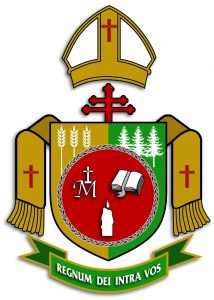HOMILY CHRIST THE KING SUNDAY – B
Christ the Servant King
(Daniel 7:13-14; Psalm 93; Rev 1:5-8; John 18:33-37)
**********************************************************
A wife heard her husband come back into the house not too long after he had left. She said, “Hon, I thought you were going to your lodge meeting.” “It was postponed,” He replied, “The wife of the Grand Exalted Invincible Supreme Potentate wouldn’t let him attend tonight.”
Live in the Kingdom of God through humble service.
Kelly Nemeck was an Oblate director of Leb Shemeah, a House of Prayer in southern Texas. A simple humble person, he had a particularly strong aversion to this feast. To him, this title of King was a title Jesus avoided, that he never wanted.
There is a danger in that title to this day because it may lead us again to misunderstand who Jesus was; what he came to accomplish and how he accomplished it. The solution is to change the name of the feast to Christ the Servant King.
 There is a positive meaning to this feast. Jesus is a different kind of king who lived a revolutionary set of counter-cultural values, values such as humility, love, compassion and especially forgiveness. He taught and lived the beatitudes, eight ways of being in this world that would transform our society if understood and lived out.
There is a positive meaning to this feast. Jesus is a different kind of king who lived a revolutionary set of counter-cultural values, values such as humility, love, compassion and especially forgiveness. He taught and lived the beatitudes, eight ways of being in this world that would transform our society if understood and lived out.
Through his humble birth, a life of sacrificial love (including washing the feet of his disciples), his non-violent acceptance of suffering, his death on the cross and his resurrection to new life, he showed us a different image of kingship, a servant king.
We are invited by this feast to recognize our own dignity as children of this kind of king, and to strive to live in his kingdom by living a life of service as he did, and by living the same values that he lived and taught, especially the beatitudes.
 It is in the spirit of living in the reign of this servant king that I chose my motto as an archbishop, Regnum Dei Intra Vos, The Reign of God is Among Us. The Coat of Arms that accompanies that motto spells it out: the Word of God (Raema) gathers us into community (Koinonia). We celebrate that reality (Liturgia) and are then sent out into the world like the first disciples (Diaconia) to serve the needs of the world. Mary, our mother, is the first and the model disciple through her faith in Jesus and her caring for others.
It is in the spirit of living in the reign of this servant king that I chose my motto as an archbishop, Regnum Dei Intra Vos, The Reign of God is Among Us. The Coat of Arms that accompanies that motto spells it out: the Word of God (Raema) gathers us into community (Koinonia). We celebrate that reality (Liturgia) and are then sent out into the world like the first disciples (Diaconia) to serve the needs of the world. Mary, our mother, is the first and the model disciple through her faith in Jesus and her caring for others.
Someone who understood this well was Lillian Yonkers, former president of the Oblate School of Theology in San Antonio, Texas. The participants in the Ministry To Ministers sabbatical program were told that she would be attending our closing banquet. There was some consternation as the banquet began without her – there was only an empty seat and place set at the table. Then suddenly she appeared, coming out the kitchen door wearing an apron and carrying platters of food. She had come to our banquet, not as the quest of honour, but to serve us at table, a gesture that touched all of us deeply as we saw the gospel of Christ, the servant king, being lived out before our eyes.
The Eucharist is a banquet at which Christ himself once again serves us. He does so by making present for us that same love on the cross by which he redeemed the world.
We who participate in this meal are commissioned to go out now as servant kings in our own right, to love and serve and heal this broken world through the power of his love and his spirit.



